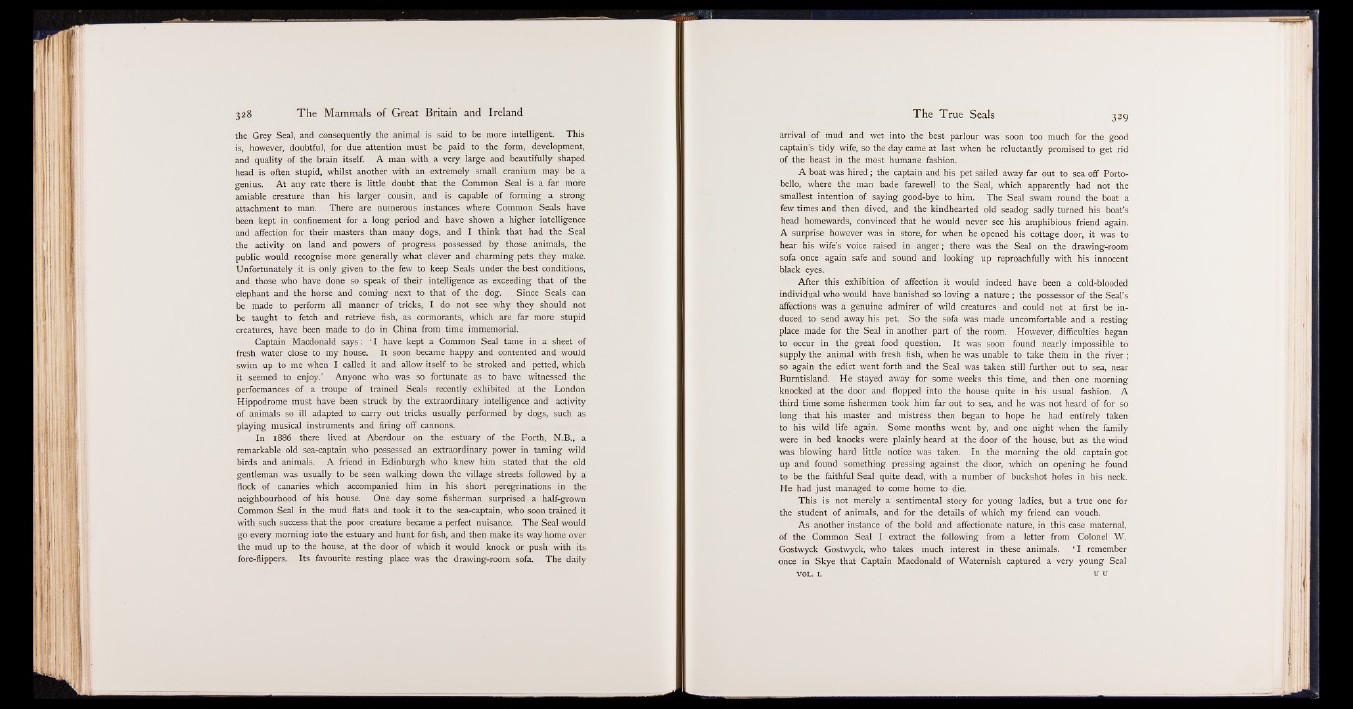
the Grey Seal, and consequently the animal is said to be more intelligent. This
is, however, doubtful, for due attention must be paid to the form, development,
and quality of the brain itself. A man with a very large and beautifully shaped
head is often stupid, whilst another with an extremely small cranium may be a
genius. At any rate there is little doubt that the Common Seal is a far more
amiable creature than his larger cousin, and is capable of forming a strong
attachment to man. There are numerous instances where Common Seals have
been kept in confinement for a long period and have shown a higher intelligence
and affection for their masters than many dogs, and I think that had the Seal
the activity on land and powers of progress possessed by those animals, the
public would recognise more generally what clever and charming pets they make.
Unfortunately it is only given to the few to keep Seals under the best conditions,
and those who have done so speak of their intelligence as exceeding that of the
elephant and the horse and coming next to that of the dog. Since Seals can
be made to perform all manner of tricks, I do not see why they should not
be taught to fetch and retrieve fish, as cormorants, which are far more stupid
creatures, have been made to do in China from time immemorial.
Captain Macdonald says: ‘ I have kept a Common Seal tame in a sheet of
fresh water close to my house. It soon became happy and contented and would
swim up to me when I called it and allow itself to be stroked and petted, which
it seemed to enjoy.’ Anyone who was so fortunate as to have witnessed the
performances of a troupe of trained Seals recently exhibited at the London
Hippodrome must have been struck by the extraordinary intelligence and activity
of animals so ill adapted to carry out tricks usually performed by dogs, such as
playing musical instruments and firing off cannons.
In 1886 there lived at Aberdour on the estuary of the Forth, N.B., a
remarkable old sea-captain who possessed an extraordinary power in taming wild
birds and animals. A friend in Edinburgh who knew him stated that the old
gentleman was usually to be seen walking down the village streets followed by a
flock of canaries which accompanied him in his short peregrinations in the
neighbourhood of his house. One day some fisherman surprised a half-grown
Common Seal in the mud flats and took it to the sea-captain, who soon trained it
with such success that the poor creature became a perfect nuisance. The Seal would
go every morning into the estuary and hunt for fish, and then make its way home over
the mud up to the house, at the door of which it would knock or push with its
fore-flippers. Its favourite resting place was the drawing-room sofa. The daily
arrival of mud and wet into the best parlour was soon too much for the good
captain’s tidy wife, so the day came at last when he reluctantly promised to get rid
of the beast in the most humane fashion.
A boat was hired; the captain and his pet sailed away far out to sea off Porto-
bello, where the man bade farewell to the Seal, which apparently had not the
smallest intention of saying good-bye to him. The Seal swam round the boat a
few times and then dived, and the kindhearted old seadog sadly turned his boat’s
head homewards, convinced that he would never see his amphibious friend again.
A surprise however was in store, for when he opened his cottage door, it was to
hear his wife’s voice raised in anger; there was the Seal on the drawing-room
sofa once again safe and sound and looking up reproachfully with his innocent
black eyes.
After this exhibition of affection it would indeed have been a cold-blooded
individual who would have banished so loving a nature ; the possessor of the Seal’s
affections was a genuine admirer of wild creatures and could not at first be induced
to send away his pet. So the sofa was made uncomfortable and a resting
place made for the Seal in another part of the room. However, difficulties began
to occur in the great food question. It was soon found nearly impossible to
supply the animal with fresh fish, when he was unable to take them in the river;
so again the edict went forth and the Seal was taken still further out to sea, near
Burntisland. He stayed away for some weeks this time, and then one morning
knocked at the door and flopped into the house quite in his usual fashion. A
third time some fishermen took him far out to sea, and he was not heard of for so
long that his master and mistress then began to hope he had entirely taken
to his wild life again. Some months went by, and one night when the family
were in bed knocks were plainly heard at the door of the house, but as the wind
was blowing hard little notice was taken. In the morning the old captain got
up and found something pressing against the door, which on opening he found
to be the faithful Seal quite dead, with a number of buckshot holes in his neck.
He had just managed to come home to die.
This is not merely a sentimental story for young ladies, but a true one for
the student of animals, and for the details of which my friend can vouch.
As another instance of the bold and affectionate nature, in this case maternal,
of the Common Seal I extract the following from a letter from Colonel W.
Gostwyck Gostwyck, who takes much interest in these animals. ‘ I remember
once in Skye that Captain Macdonald of Waternish captured a very young Seal
VOL. 1. u u